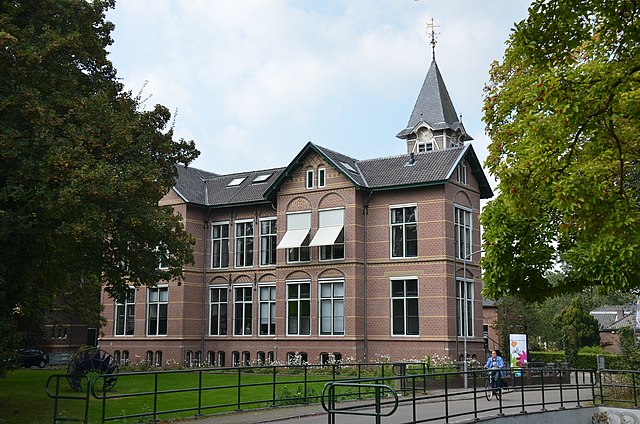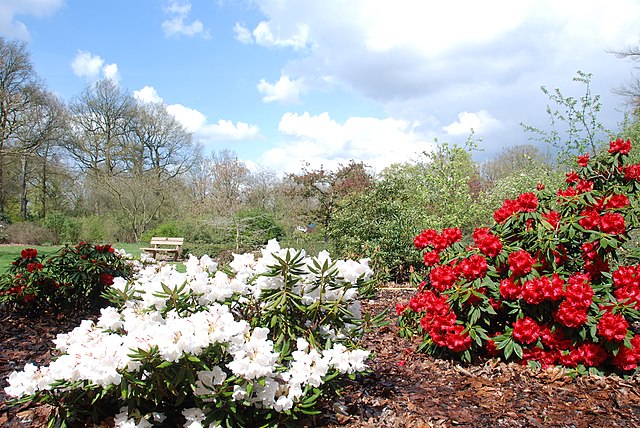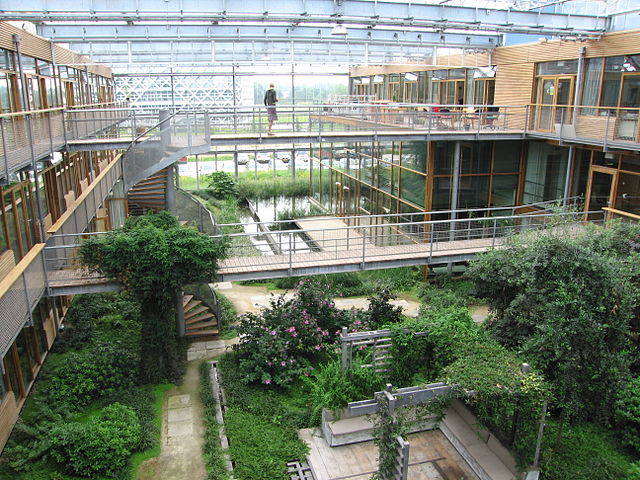As Thammasat University students grow accustomed to online learning and distance education, some may wish to explore overseas opportunities after they have done their required coursework. Taking an extra class may be informative and help complement main areas of study, giving students new ideas and perspectives and help them to practice their English language usage.
One opportunity to consider may be free massive open online courses (MOOCs) at Wageningen University & Research , the Netherlands.
Wageningen University & Research (WUR) is a public research university in Wageningen, the Netherlands. It is located in a region of the Netherlands known as the Food Valley.
The Thammasat University Library owns a number of academic research studies published in Wageningen.
These include Agricultural markets beyond liberalization edited by Aad van Tilburg, Henk A.J. Moll, and Arie Kuyvenhoven, available for loan at the Puey Ungphakorn Library, Faculty of Economics, Tha Prachan campus; The impact of national culture in MNC’s home country on the strategy making process in their overseas subsidiaries: a comparison between Dutch and Japanese companies in Thailand by Keatkhamjorn Meekanon, available for loan at the Pridi Banomyong Library; Tha Prachan campus; Quality management in food chains edited by Ludwig Theuvsen, available for loan at the Puey Ungphakorn Library, Rangsit campus; and Remote sensing techniques for mangrove mapping by Chaichoke Vaiphasa, available for loan: Pridi Banomyong Library.
WUR consists of Wageningen University and the former agricultural research institute of the Dutch Ministry of Agriculture. WUR trains specialists (BSc, MSc and PhD) in life and social sciences and focuses its research on scientific, social and commercial problems in the field of life sciences and natural resources. It is widely known for its agriculture, forestry, and environmental studies programs. The university has about 12,000 students from over 100 countries. It is also a member of the Euroleague for Life Sciences (ELLS) university network.
As its website explains,
The Euroleague for Life Sciences (ELLS) is a network of leading universities cooperating in the fields of Natural Resource Management, Agricultural and Forestry Sciences, Life Sciences, Veterinary Sciences, Food Sciences, and Environmental Sciences.

Among course opportunities available for TU students is Landscape Governance: Collaborating Across Sectors and Scales:
Finding local solutions to global challenges relies on collaboration & innovation. Equip yourself with the knowledge & skills to design and implement effective landscape governance that harnesses the power of place for sustainable landscape solutions.
About this course
Increasing global complexities and interconnectedness offer both opportunities and challenges to our collective ability to deal with climate change, food insecurity, resource depletion and degradation and the many conflicts that arise due to scarcity. The solutions to many of these issues need both global attention, but also local action.
Join this online course to kick-start your efforts to unite stakeholders and design governance structures, processes and partnerships embedded in place that capitalize on strengths and balance and mitigate threats.
Achieving the Sustainable Development Goals and building healthy and productive landscapes can only happen with effective stakeholder engagement. Landscape governance is therefore key to balance and manage the many trade-offs and interdependencies that happen across sectors and scales in and around landscapes.
Taking this online course requires you to look at a landscape and its governance from a new perspective. With the landscape as the place, you will think spatially and explore transboundary governance that flows from the natural landscape and overcomes static, traditional administrative levels and barriers.
Once you sign up, you’ll be whisked away to exciting real-world landscapes to learn from global experiences and see how even in the most challenging circumstances, effective governance leads to innovation and sustainable development in landscapes.
You’ll also be challenged to assess the roles of formal and informal institutions in a highly interactive fashion. By the end of this course, you have analysed the multi-actor, multi-sector and multi-scale character of a landscape which is necessary to create sustainable and innovative landscape governance arrangements.
Professional Certificate Programme: Sustainable and Inclusive Landscapes
This course is also part of the Sustainable and Inclusive Landscapes Professional Certificate Programme. Following the complete programme lets you harness the power of place and advance your career as a landscape leader. The programme consists of the following courses, which can be taken in any given order:
Landscape Leadership: Catalyse Sustainable Development in Landscapes
Landscape Finance: Investing in Innovation for Sustainable Landscapes
Climate Action in Biodiverse Landscapes
Landscape Governance: Collaborating Across Sectors and Scales (this course)
Collaboration
This course has been designed by Wageningen Centre for Development Innovation, with contributions from the Horn of Africa Regional Centre (HOAREC) in Ethiopia, and South Rift Association of Land Owners (SORALO) in Kenya. It has been financed by the Netherlands Ministry of Agriculture, Nature and Food Quality.
What you’ll learn
- How to apply an integrated and spatial approach and to think beyond traditional governance arrangements
- Understand and manage landscape and stakeholder dynamics for successful landscape interventions
- Learn why formal and informal institutions are key to landscape governance
- Explore opportunities for achieving policy integration within your own landscape
- Analyse the strengths and weaknesses within your landscape and create innovative governance arrangements at landscape level
The TU Library collection includes a number of books about landscape governance.
Course instructors will be Ilse Hennemann, Advisor for Climate Change & Environmental Governance at the Wageningen Centre for Development Innovation and Assumpta Uzamukunda, Advisor in landscape governance at the Wageningen University & Research and SNV Netherlands Development Organisation Rwanda.
As her faculty webpage indicates,
Ilse Hennemann is a human geographer and environmental sociologist in the areas of environmental governance, landscape approaches,climate change and multi-stakeholder processes in the wider eco-agricultural landscapes.

Another learning opportunity would be Circular Fashion: Design, Science and Value in a Sustainable Clothing Industry:
The fundamentals of circular fashion unraveled, learn about circularity in all steps of the fashion value chain. From new textile materials and circular design all the way to business modelling.
About this course
The fashion industry has a large influence on the global economy and is more and more known for its social and environmental impact. Everywhere, new sustainable initiatives are arising from recycling, upcycling to creating clothes from compostable materials. Circularity tough, is a complex phenomenon. What will the future bring us? Are we indeed going to decompose our clothes in our own garden?
This online course brings you a comprehensive introduction in circular fashion brought to you by roughly thirty different experts from both academia and practice. You will learn about the versatile task of transitioning towards circular fashion, from the unique collaboration between Wageningen University & Research, ArtEZ University of the Arts and many other experts.
After the course you will know the core concepts and tools to help better understand circular economy in the fashion industry. Some of the topics that are covered focus on understanding the challenge of recycling, design for circularity, alternative textiles through biobased innovation and circular business modelling to help bring innovations to the market.
For whom?
This course will provide designers, retailers, scientists, engineers and all working at the industry or with an interest in fashion with holistic insights in the complex challenges of circular fashion, while engaging you to start the transition to circularity within your personal and/or professional practices. We will bring together art, design and science to move beyond an ego-centric approach of fashion and start from an ecosystems perspective.
Learn the theory, understand the practice and start your own circular fashion journey. Join the movement towards a circular fashion industry!
What you’ll learn
- The difference between sustainability & circularity
- Constructing identity through consumption
- The difference between eco to ego in fashion
- Design for circularity
- Reflect on design thinking
- Ecosystem circularity
- Individual agency and organic collectives in fashion
- Critique small-scale solutions
- Ecosystems in nature
- Challenge of governing the transition towards circularity from outsourcing countries
- Closing the loop in fashion
- The complexity of textiles
- Challenges and opportunities of textile recycling
- Understand the loop of organic- and synthetic textiles
- Challenge of textile blends
- Design for recycling and disassembly
- Biobased innovation and new materialism
- Learn about future raw materials
- New production processes
- Production capacity, automation and upscaling
- Forecasting biomaterials in fashion
- Debating fast fashion and online marketing
- Business as crafting value
- Circular business modelling
- Circular business in second hand clothing market
- Learn about a new economic paradigm
- Understand investment and acceleration
- Insight into blockchain
- How blockchain can be used for transparency in the fashion value chain
- Understand fashion from a retail perspective
- E-commerce and circular retail models
Among instructors will be Professor Louise O. Fresco, President of the Executive Board of Wageningen University & Research, Dr. Kim Poldner, Professor of Circular Business at The Hague University of Applied Sciences, Dr. Nishant Shah, Vice-President of Research at ArtEZ University of the Arts, and Dr. Jeroen van den Eijnde, Professor Product Design & Interior Architecture, ArtEZ University of the Arts.

(All images courtesy of Wikimedia Common

